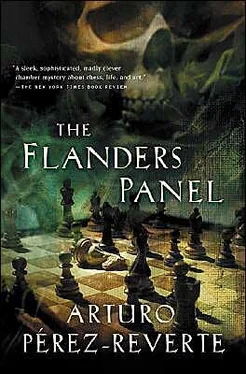Flaring her nostrils as if trying to sniff out the direction danger might come from, she gritted her teeth and called up in her aid all the rage contained in her memories of Alvaro and Menchu, and the decision not to be just a frightened pawn on a chessboard, but someone quite capable, given the opportunity, of demanding an eye for an eye and a tooth for a tooth. If he, whoever he was, wanted to find her, then he would, be it in Room 12 or in hell.
She went through the inner door, which, as expected, was unlocked. The security guard must have been far away, for the silence was absolute. She walked down an aisle of disquieting shadows cast by marble statues, who watched her pass with blank, motionless eyes, and continued through the room containing medieval retables, of which, amongst the dark shadows they made on the walls, she could make out only the occasional dull gleam of the gilt and gold leaf backgrounds. To the left, at the end of that long aisle, she saw the small staircase that led to the rooms containing early Flemish paintings, amongst them Room 12.
She paused on the first step, peering with extreme caution into the dark. The ceiling was lower there, and the security light allowed a better view of the details. In the blue penumbra, the colours of the paintings had turned to monochrome. She could make out Van der Weyden’s Descent from the Cross, almost unrecognisable in the shadows. In the unreal darkness it took on an air of sinister grandeur, revealing only its palest colours, the figure of Christ and the face of his mother, fainting, her fallen arm parallel with the dead arm of her son.
There was no one there, apart from the people in the paintings, and most of them, hidden in the dark, seemed locked in a long sleep. Distrusting the apparent calm, troubled by the presence of so many images created by the hands of men who had all died hundreds of years ago, images that seemed to be watching her from their old frames on the walls, Julia reached the door leading into Room 12. Her throat was dry but she could not swallow. She glanced over her shoulder again but could see nothing suspicious. Conscious of the knot of tension in her jaw muscles, she took a deep breath before going into the room as she’d seen people in films do: grasping the gun in both hands, pointing into the shadows, her finger on the trigger.
There was no one there, and Julia felt an immense, intoxicating sense of relief. The first thing she saw, its colours muted by the shadows, was the dazzling nightmare of Bosch’s The Garden of Delights, which took up most of one wall. She leaned against the opposite wall, her breath blurring the glass protecting Durer’s self-portrait. With the back of her hand she wiped away the sweat from her forehead before going over to the wall at the far end of the room. As she walked, the shapes and the lighter tones of Brueghel’s painting began to emerge. That painting had always held a peculiar fascination for her. The tragic tone that informed every brush stroke, the eloquence of the innumerable figures shaken by the mortal, inexorable breath, the many scenes that made up the macabre whole, had for many years stirred her imagination. The feeble blue light from the ceiling illuminated the skeletons bursting in hordes from the bowels of the earth, in a vengeful, all-destroying wind; the distant fires silhouetting the black ruins on the horizon; the wheels of Tantalus in the distance, spinning atop their poles, next to the skeleton who stands with sword raised, about to bring it down on the neck of the blindfolded prisoner kneeling in prayer; in the foreground, the king surprised in the middle of the feast, the lovers oblivious even at the final hour, the smiling skeleton beating the drums of Judgment Day; and the knight who, trembling with terror, still has courage enough to make one last gesture of valour and rebellion, and unsheathes his sword, ready to fight for his life in one last hopeless battle.
The card was there, stuck in the frame just above the gilt plate on which, Julia knew, were the four sinister words that form the title of the painting: The Triumph of Death.
When she reached the street, it was pouring with rain. The light from the Isabelline street lamps lit up the curtains of water that burst in torrents out of the darkness and beat on the paving stones. The puddles were spattered by fat drops of rain, splintering the reflections of the city into a furious coming and going of lights and shadows.
Julia lifted her face to the rain and let it run freely over her hair and face. Her cheekbones and lips grew taut in the cold and her wet hair clung to her face. She buttoned her raincoat at the neck and walked between the hedges and stone benches indifferent to the rain and the dampness invading her shoes. The images in the Brueghel painting were still engraved on her retina; the terrifying medieval tragedy still danced before her eyes. And in it, amongst the men and women submerged by the avalanche of avenging skeletons exploding out of the earth, she could clearly see the characters from the other picture: Roger de Arras, Ferdinand Altenhoffen, Beatrice of Burgundy. In the middle distance, she could even see the lowered head and resigned face of old Pieter Van Huys. Everything came together in that one definitive scene, where, regardless of how the dice fell, the last dice thrown on the card table of the Earth, beauty and ugliness, love and hatred, good and evil, hard work and profligacy would all meet their end. Julia had also seen herself in the mirror, which reproduced with pitiless clarity the breaking of the Seventh Seal of the Apocalypse. She was the young woman with her back to the scene, absorbed in her daydreams, mesmerised by the music played on a lute by a grinning skeleton. In that sombre landscape there was no room now for pirates and hidden treasure, all the Wendys were being dragged away, kicking and screaming, by the legion of skeletons; Cinderella and Snow White, their eyes wide with terror, could smell the sulphur, and the little tin soldier, Roger de Arras, like St George without his dragon, stood with his sword half out of its sheath, unable to help them now. He had enough to do lunging vainly into the void, a mere point of honour, before joining hands, like everyone else, with the fleshless hands of Death, who was drawing them all in to join his macabre dance.
The headlights of a car lit up a telephone booth. Julia scrabbled for some coins in her bag, moving as if in a dream. Mechanically, her drenched hair dripping into the earpiece, she dialled the numbers of Cesar and Munoz without getting a reply. She leaned her head against the glass and placed between her lips, numb with cold, a damp cigarette. Standing with her eyes closed, she let the smoke curl about her until the tip began to burn the skin between her fingers and she dropped it. As the rain beat down monotonously, she knew, with a disconsolate feeling of infinite tiredness, that this was only a fragile truce, which could not protect her from the cold, the lights and the shadows.
She had no idea how long she stood there. At one point she put the coins in the telephone again and dialled a number, Munoz’s this time. When she heard his voice, she seemed to come slowly to her senses, as if returning from a long journey, a journey through time and herself. With a serenity that grew as she spoke, she explained what had happened. Munoz asked what the card said, and she told him: B x P, bishop takes pawn. There was silence at the other end of the line. Then Munoz, in a strange voice she’d never heard before, asked where she was. When she told him, he said she was not to move; he’d be there as soon as possible.
Fifteen minutes later, a taxi drew up by the telephone booth, and Munoz opened the door and told her to get in. Julia ran out into the rain and dived into the car. As the taxi drove off, Munoz removed her soaked raincoat and placed his own around her shoulders.
Читать дальше












